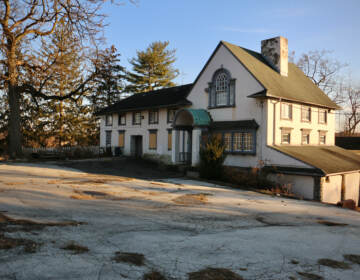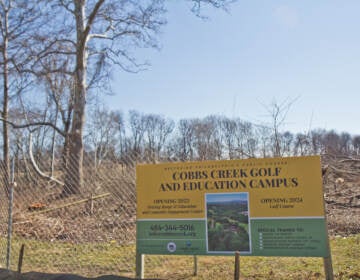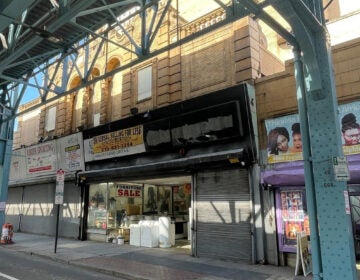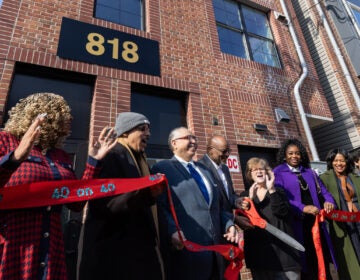Nonprofit renovating Cobbs Creek Golf Course could get $3 million boost with city funds
The lease with the foundation renovating the course doesn’t require the city to help with any money. But officials want to contribute $3 million over two years.
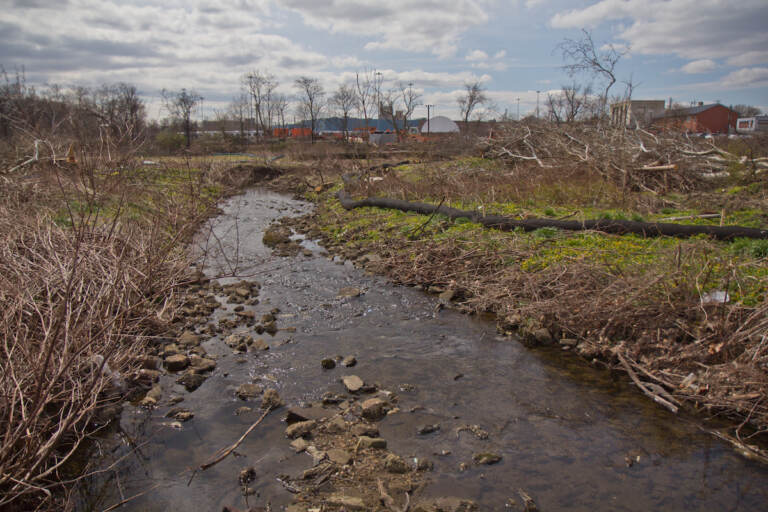
File photo: A sock filled with wood chips along the creek at the Cobbs Creek Golf Course is said to help prevent erosion. (Kimberly Paynter/WHYY)
The City of Philadelphia could spend millions to help restore the floodplain on its Cobbs Creek Golf Course, despite a multi-million dollar commitment from the private foundation the city has leased the property to.
The lease agreement finalized in December states that the city is under no obligation to invest in the 350-acre property, which it rents to the nonprofit Cobbs Creek Foundation for $1.
The foundation plans to restore the iconic public golf course — which welcomed players of color decades before other courses and the PGA — back to its 1916 design, strengthen connections with the surrounding communities, and raise $65 million to make it all happen. That could include $3 million from the city over Fiscal Years 2023 and 2024, as outlined in Mayor Kenney’s proposed capital program.
“I’m very grateful that the administration found some room for it,” said City Parks and Recreation Commissioner Kathryn Ott Lovell in an interview Monday. “My guess is that they see this as a really important project and a great opportunity to leverage the massive investment that the foundation is already making in the project itself.”
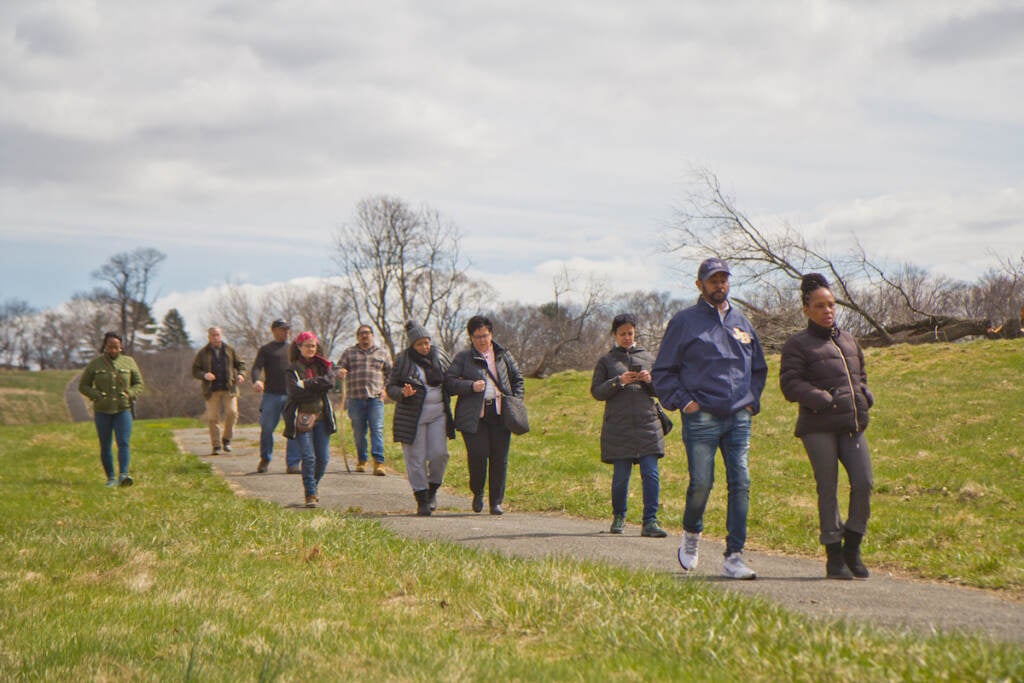
The city money would go toward the Cobbs Creek Foundation’s floodplain restoration project, key to the foundation’s plan to eliminate chronic flooding which often made the course unplayable. It includes restoring three miles of streams and creating 37 acres of wetlands, for a total of 10 square miles of drainage area on the property. For context, the $3 million proposed over two fiscal years is the same amount proposed in Kenney’s capital program for renovations of homeless shelters, and slightly less than the amount earmarked for the city-owned zoo and art museum.
The renovation of the Cobbs Creek Golf Course — which went from one of the best public golf courses in America to a stranded city asset — will also involve a new education and community engagement center, discounted rates for city residents, as well as partnerships with area school districts to provide career skills programs and other opportunities for Philly’s young people.
It’s normal for the city to contribute money in order to leverage larger private investments in city assets, Ott Lovell said. Take for example the planned highway cap at Penn’s Landing — which would get more than $50 million over the next six years in Kenney’s capital plan — or the Schuylkill River Trail bathrooms, or Bartam’s Garden, she said.
“The restoration of the creek … has been the responsibility of the city, but has not been something the city’s been able to undertake,” she said. “The foundation couldn’t restore the golf course without the restoration of the creek. So while it was the city’s responsibility, it was clear to the foundation that this wasn’t going to be able to be funded by the city in its totality.”
The city’s $3 million capital donation would be part of the estimated $15 million the foundation has budgeted for the floodplain restoration. The foundation also expects to receive funding in the form of creek restoration credits from the state Department of Environmental Protection (the Foundation originally expected to get around $15 million worth of these credits, but is now in negotiations for a “significantly lower amount,” Rodriguez said.)
City Council must approve the Mayor’s capital budget. City Councilmember Curtis Jones, Jr., whose district includes the golf course, joined a tour of the property Monday alongside Ott Lovell, leaders of the foundation, neighbors and environmental advocates critical of the foundation’s work to date. Jones expressed hesitation about a city investment.
“I think it, at this point, should be the foundation [putting in money],” he said.
Jones said he was not aware of what exactly the $3 million requested by the Mayor’s office would pay for, but indicated he would support such an investment if it helped his constituents access the course.
“If that $1.5 [million] goes for external things, maybe sidewalks and lights and tree streetscapes, I’m for it,” he said. “I don’t want it to be for the ninth hole.”
The Cobbs Creek Foundation has come under fire for cutting down hundreds of trees, many of them several feet wide, on the property — sparking concerns about increased erosion, flooding and habitat loss. City officials and foundation leadership maintain that the tree removal has not contributed to erosion or increased flood risk, but was necessary in part for the creation of the wetlands, which they say will provide a stormwater management benefit to the surrounding community. But locals have also complained of what they see as a weak public engagement process that failed to reach many neighbors.
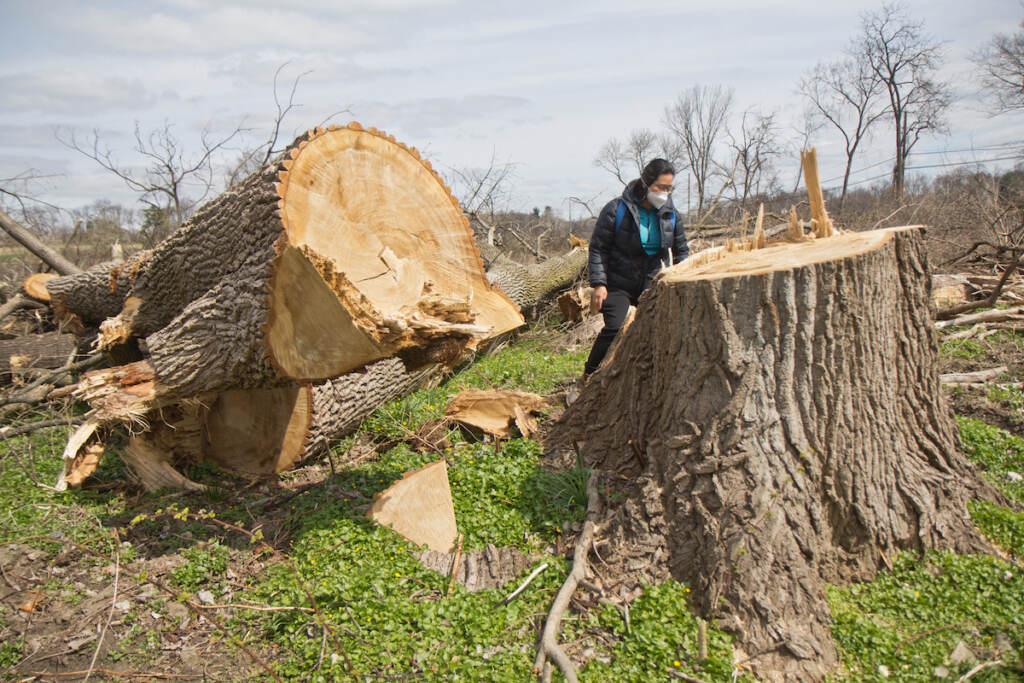
“It was just like my backyard has been butchered,” said Simone Scott, a nearby resident who used to take her kids for walks through the overgrown golf course, after Monday’s tour of the property. “I just can’t believe they did all this, like without really talking to people.”
To Miguel Chavarria, who lives nearby and remembers playing in the stream and caddying at the golf course as a youth, the tree removal was devastating — but he thinks the city should still put money into the project.
“It is city land, so there should be some investment from the city in it,” he said. “It should be both — a partnership.”
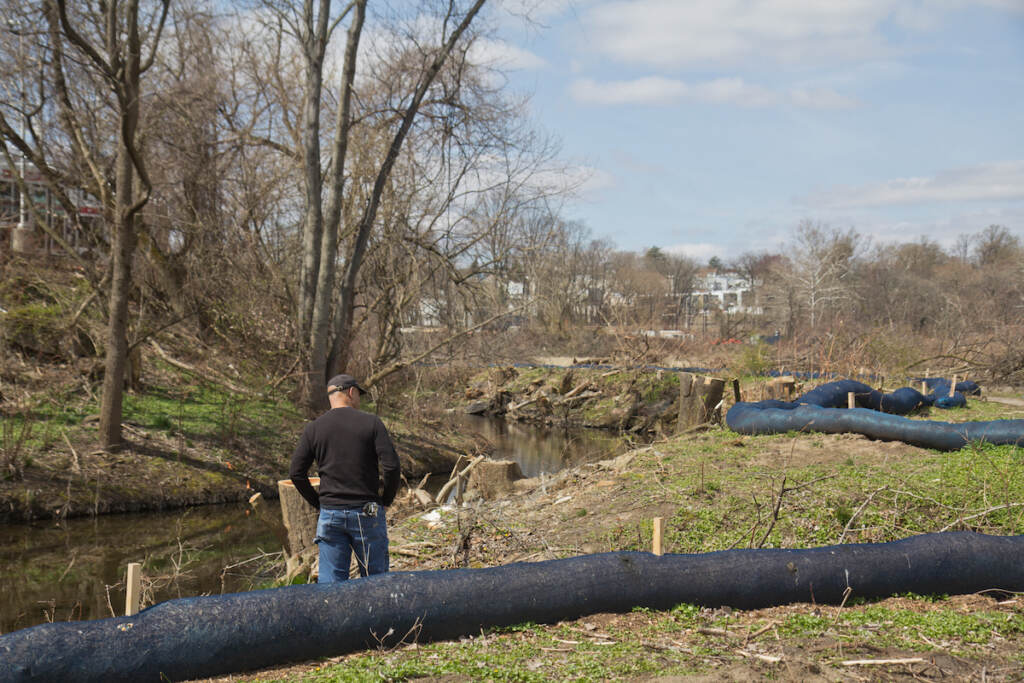
The foundation continues to advance toward raising its overall $65 million commitment, said Michael Rodriguez of Ceisler Media & Issue Advocacy, speaking on behalf of the foundation. The city’s proposed contribution is part of an “ongoing public-private partnership” to make the area more resilient to flooding, he said. Foundation leadership say they’re 90% finished with the floodplain restoration plan they’re working with the city to finalize.
“Cobbs Creek Golf Course is an irreplaceable piece of Philadelphia’s cultural identity and heritage, and is vital to the history of Black golf in the United States,” Rodriguez said. “The Cobbs Creek Foundation continues to raise the necessary funds to revitalize this national treasure and develop an educational campus which will provide opportunity for Philadelphia’s youth.”

Get daily updates from WHYY News!
WHYY is your source for fact-based, in-depth journalism and information. As a nonprofit organization, we rely on financial support from readers like you. Please give today.




